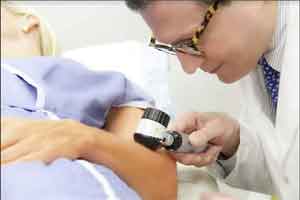- Home
- Editorial
- News
- Practice Guidelines
- Anesthesiology Guidelines
- Cancer Guidelines
- Cardiac Sciences Guidelines
- Critical Care Guidelines
- Dentistry Guidelines
- Dermatology Guidelines
- Diabetes and Endo Guidelines
- Diagnostics Guidelines
- ENT Guidelines
- Featured Practice Guidelines
- Gastroenterology Guidelines
- Geriatrics Guidelines
- Medicine Guidelines
- Nephrology Guidelines
- Neurosciences Guidelines
- Obs and Gynae Guidelines
- Ophthalmology Guidelines
- Orthopaedics Guidelines
- Paediatrics Guidelines
- Psychiatry Guidelines
- Pulmonology Guidelines
- Radiology Guidelines
- Surgery Guidelines
- Urology Guidelines
Vitamin A rich food can protect you from skin cancer: JAMA Study

Delhi: Increased intake of vitamin A reduces the risk for cutaneous squamous cell carcinoma (SCC) -- the second-most-common type of skin cancer, finds a recently published study in the renowned journal JAMA Dermatology.
According to the study, people whose diets contained high levels of vitamin A were at 17% lower risk of SCC compared to people who consumed modest amounts of supplements and foods enriched in vitamin A.
Plant-based sources of vitamin A include not only sweet potatoes and carrots but leafy green vegetables and fruits like apricots and cantaloupe. Milk, some types of fish and liver are rich sources of animal-based vitamin A.
The study provides another reason to eat lots of fruits and vegetables as part of a healthy diet. Skin cancer is hard to prevent but this study suggests by eating a healthy diet rich in vitamin A and wearing sunscreens when out in the sun can reduce your risk of skin cancer.
Retinoids, bioactive forms of vitamin A, are required for healthy growth and maturation of skin cells. Synthetic retinoids, having potentially adverse effects, are used in chemoprevention of skin cancer among high-risk populations. However, there have been limited prior studies demonstrating the effectiveness of vitamin A in reducing skin cancer risk.
Jongwoo Kim, Department of Dermatology, Warren Alpert Medical School of Brown University, Providence, Rhode Island, and colleagues examined whether vitamin A intake is associated with a reduction in SCC risk by analyzing data from two long-term observational studies.
Also Read: Uncover the truth about how to protect your skin this summer with 10 myth busters
For the purpose, the researchers looked at the diet and skin cancer results of participants in two large, long-term observational studies: the Nurses' Health Study, which followed 121,700 U.S. women from 1984 to 2012, and the Health Professionals Follow-Up Study, which followed 51,529 U.S. men from 1986 to 2012.
Between the two studies, some 123,000 participants were white (and thus had a significant risk of developing skin cancer), had no prior history of cancer and completed the dietary reports multiple times. Among these individuals included in the team's subsequent analysis, a total of 3,978 cases of squamous cell carcinoma was reported and verified within the 24- or 26-year follow-up periods.
Both studies also asked the participants about hair color, the number of severe sunburns they had received in their lifetime and any family history of skin cancer, and the researchers adjusted for these and other factors. The studies did not, however, ask participants about their avoidance of mid-day sun, known to be a major risk factor for skin cancer.
After grouping the study participants into five categories by vitamin A intake levels, the researchers found that:
- People in the category with the highest average daily total vitamin A intake were 17 percent less likely to get skin cancer than those in the category with the lowest total vitamin A intake.
- Those in the highest category reported eating on average the amount of vitamin A equivalent to one medium baked sweet potato or two large carrots each day.
- Those in the lowest category reported eating a daily average amount of vitamin A equivalent to one-third cup of sweet potato fries or one small carrot, which is still above the U.S. Recommended Dietary Allowance of vitamin A.
- Majority of vitamin A came from the participants' diets, particularly from fruits and vegetables, rather than from animal-based foods or vitamin supplements.
- Eating high levels of other plant-based pigments similar to vitamin A -- such as lycopene, commonly found in tomatoes and watermelon -- was associated with decreased risk of skin cancer.
Also Read: Vitamin A supplementation lowers retinopathy of prematurity incidence in preterm infants
The researchers cautioned that too much vitamin A, particularly from supplements and animal sources, can lead to nausea, liver toxicity, increased risk of osteoporosis and hip fracture, and even birth defects. Side effects from high levels of plant-based vitamin A are minimal, they added.
"Our findings suggest that increased intake of diet rich in vitamin A can decrease the risk of SCC. Future studies are needed to determine the role of vitamin A supplementation in chemoprevention of SCC," concluded the authors.

Disclaimer: This site is primarily intended for healthcare professionals. Any content/information on this website does not replace the advice of medical and/or health professionals and should not be construed as medical/diagnostic advice/endorsement or prescription. Use of this site is subject to our terms of use, privacy policy, advertisement policy. © 2020 Minerva Medical Treatment Pvt Ltd